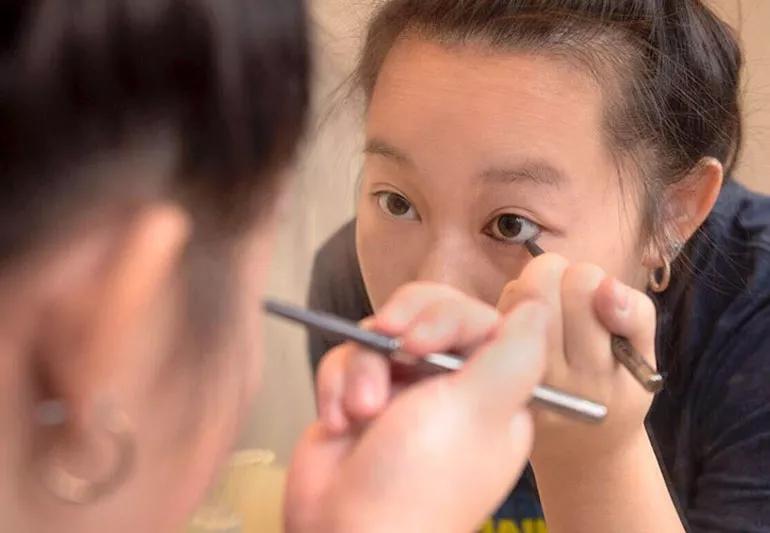How to reduce risk of infection and eye injury

Image content: This image is available to view online.
View image online (https://assets.clevelandclinic.org/transform/2f7e57a8-b7ac-4656-8cc5-73c44b8ed485/eyeliner-YKL-051820-770x533-1_jpg)
woman applying eyeliner
As you’re applying mascara and eyeliner, you probably don’t think of the harmful effects some of your favorite beauty products can bring. Yet, harmful bacteria and fungus can hide within your pencils and wands. Ophthalmologist Shalini Sood-Mendiratta, MD, unpacks the 411 on seven eye makeup safety tips to keep the dirt out of your eyes.
Advertisement
Cleveland Clinic is a non-profit academic medical center. Advertising on our site helps support our mission. We do not endorse non-Cleveland Clinic products or services. Policy
It can be easy to lose track of how long you’ve had that favorite eye shadow color, but cosmetics do have a shelf life — some longer than others. Dr. Sood-Mendiratta advises against keeping eye products for longer than about three months.
“If the mascara or eyeliner is old, this increases the chances that bacteria or fungus have contaminated it. If any of this gets introduced directly into your eye, you could end up with a serious eye infection,” she says.
One super simple way to remind yourself to get rid of older makeup products? Use a permanent marker or sticker label with the date you purchased them or should throw them out.
It’s important to pay attention to the ingredient label on your makeup. For example, kohl, a product used to enhance eye makeup in other countries, is linked to lead poisoning in children. Other ingredients to avoid include talc, BHA (butylated hydroxyanisole), urea, sulfates and phthalates, Dr. Sood-Mendiratta says. Some of these ingredients act as preservatives, stabilizers or anti-caking agents, but they can also irritate skin or are associated with cancer risk in large amounts.
Love to apply eyeliner along the inside of your eyelids? If you’re a fan of this technique (sometimes referred to as “waterlining”), you should know that this blocks the oil glands that secrete oils that protect your cornea. It also can introduce bacteria directly into the eye.
Advertisement
A small, pilot study found that particles from eyeliner applied inside the eyelids can contaminate the eye. Although when this happened, the particles were cleared away by the eye within a couple hours, researchers concluded that this could cause problems for contact lens wearers and people with dry eye syndrome or sensitive eyes.
Yes, glitter in your makeup can add sparkle to your eyes, but it can also flake off and add sparkles in your eyes — causing redness and irritation.
“Not only can glittery eye makeup exacerbate chronically dry eyes, glitter is another common cause of corneal irritation and infection,” Dr. Sood-Mendiratta says.
If you have a history of allergies or have extra sensitive eyes, Dr. Sood-Mendiratta says it’s a good idea to use hypoallergenic eye makeup. Look closely at labels to find products designed for sensitive eyes, as they are less likely to be irritating. You can find all-natural, allergen-free cosmetics at larger drug and department stores.
If you use an eyelash curler, do so on clean, dry lashes before you use mascara. Also, make certain the curler’s rubber is soft and not stiff and cracking.
“If you have a nickel allergy, spend a little more on a nickel-free eyelash curler,” Dr. Sood-Mendiratta advises.
You might feel tempted to save time while rushing to work or heading out to meet friends by applying mascara between stoplights. However, a sudden tap on the brakes or bump in the road could cost you.
“A mascara wand or applicator can scratch your eye and cause a corneal abrasion, which would need evaluation and treatment by an ophthalmologist,” Dr. Sood-Mendiratta says.
Rather than risk poking or scraping your eye — or worse — it’s best to get up just a few minutes earlier in the morning (hard, we know!) to allow ample time for applying makeup.
Make an appointment to see your ophthalmologist if you continue to experience:
You may have a corneal abrasion or infection that requires medical treatment, Dr. Sood-Mendiratta says.
Advertisement

Delivered every Tuesday!
Sign up for our Health Essentials emails for expert guidance on nutrition, fitness, sleep, skin care and more
It's a letter about the news!

Every two weeks once
Sign up for our Health Essentials emails for expert guidance on nutrition, fitness, sleep, skin care and more.
Learn more about our editorial process.
Advertisement
Most recommended precautions center around minimizing bruising or swelling
Even one drink can have an impact on your cognitive function leading to slurred speech, blurred vision and impaired memory
Understand who may (and may not) benefit
Lorem ipsum dolor sit amet. Et odio Quis vel ipsam omnis eum alias deleniti et placeat impedit non voluptas galisum hic autem enim et cupiditate aliquid. Est beatae quidem non facilis autem ut commodi nisi aut tempore rerum et dolores voluptatem cum enim optio id sapiente quasi. Ad laboriosam officiis 33 cupiditate sequi ea voluptatum consectetur qui necessitatibus voluptate et quasi doloremque et facere explicabo quo explicabo officia
Seeking help through therapy can be an important step in improving your quality of life when you have UC
Type 2 diabetes isn’t inevitable with these dietary changes
Applying a hot or cold compress can help with pain
Pump up your iron intake with foods like tuna, tofu and turkey